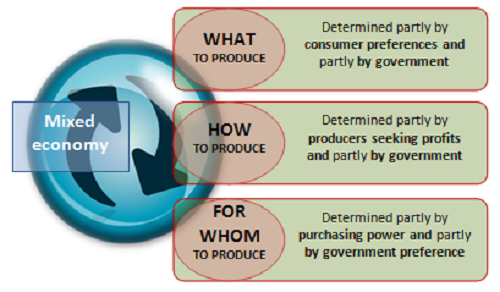Difference Between Capitalism and the Mixed Economy

Capitalism vs. Mixed Economy
There has been resurgence in the economic system known as capitalism during the past two decades. This is due to the advent of free trade, which has resulted in the unhampered movement of goods and services not only across country regions, but internationally as well. Capitalism is formally defined as a system wherein distribution and production have only one goal : profit. Capitalism embraces private ownership of institutions and discourages government intervention in the economy. The French term, laissez faire, is popularly used to support capitalism. Laissez faire asserts that government should not have control over property rights or seek to control the flow of the economy.
Capitalism first emerged in the 1600s as the successor of feudalism. Capitalism heralded the rise of industrialization, and in the 20th century, became closely identified with the globalization. The rise of capitalism in the West resulted in economic prosperity for countries such as the United States and United Kingdom. Other countries around the world gradually embraced the ideals of capitalism; some countries embraced capitalism wholly, while others chose to utilize it only partially.
There are several reasons why some countries were slow in adopting capitalism. One reason is that some countries had communist leanings. Communism was based on the ideals of Karl Marx, who believed that capitalism tended to relegate a country’s resources to the wealthy few while the greater public languished in middle-class, or worse, marginal status. A good example of a country that did not immediately embrace capitalism is China. However, nowadays, even countries with communist leanings are involved in capitalism to some extent. After all, capitalism is a means to involve a country’s national economy in the greater world economy. Such countries have economic policies that echo the ideals of capitalism, such as allowing private entities to buy or take over state-owned institutions.
However, such countries still have reservations with regards to the number and nature of institutions that can be owned by the private sector. Maintaining a balance between private and government ownership is termed as mixed economy. Unlike capitalism, which seeks no government intervention, a mixed economy allows government intervention and ownership to some extent.
Some people have likened the mixed economy a combination of capitalism and socialism. The ideals of socialism are completely opposite to those of capitalism; socialism asserts that the government should have ownership of all institutions and be in charge of production and distribution of goods and services. A mixed economy integrates both capitalism and socialism by maintaining a balance between private and government ownership. Many countries see mixed economy as an advantage due to the fact that it allows the interests of both the government and private entities to flourish. The mixed economy, however, tends to be biased towards capitalism more often than not.
Summary
- Capitalism embraces private ownership of institutions and discourages government intervention in the economy. The main goal of capitalism is profit.
- Another way to describe capitalism is via the French term ‘laissez faire’, which asserts that the government should not intervene in property rights and the economy as a whole. Capitalism goes hand-in-hand with globalization.
- Not all countries embrace capitalism wholly; some choose to maintain a balance between private and government ownership. Such countries utilize the idea of a mixed economy.
- The mixed economy is a balance between socialism and capitalism. As a result, some institutions are owned and maintained by the government, while others are owned by the private sector.
- The mixed economy allows economic participation from both the private sector and the government. However, the mixed economy is still biased towards capitalism.
- Differences Between Fraternity And Sorority - January 8, 2014
- Differences Between Lucite and Plastic - January 7, 2014
- Differences Between Oil and Butter - January 6, 2014
Search DifferenceBetween.net :
1 Comment
Leave a Response
References :
[0]http://edbus.saschina.wikispaces.net/economics+journal?responseToken=08bbbe386be0b0aed1642e6fd0f23416b

Ghana is a mixed but capitalist oriented economy